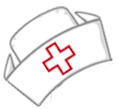If the heart and how it functions interest you, than cardiac nursing may just be perfect for you. These types of nurses usually work on what is called a telemetry floor. In bigger hospitals, there may be several telemetry floors since cardiac disease is such widespread problem today.
A telemetry nurse treats patients with heart problems. Chest pain and similar symptoms are the number one complaints of these patients. Cardiac nurses prepare patients for stress tests, cardiac catheterizations, cardiac rehabilitation and other cardiac testing. These nurses also manage patients with medications when they are having active chest pain.
Nurses are increasingly treating CHF patients. CHF stands for congestive heart failure. These patients will present with shortness of breath and fatigue. They require a lot of education on how to manage their symptoms and about the medications they are taking. It is your job as the nurse to keep ahead of all the tons of information there is available on this disease.
Frequently CHF and other cardiac patients will have problems with their electrical conduction system in the heart. This system is what makes the heart beat WHEN it should. These patients may need pacemakers or AICDs (Automatic Internal Cardiac Defibrillators) to keep their hearts functioning correctly. Telemetry nurses help prepare patients for these procedures and also assist in immediate recovery post-placement. The name for these types of patients is electrophysiology patients.
Problems in the heart can lead to failures in other parts of the body. Because of this, cardiac nurses get experience in a variety of conditions such as kidney disease, vascular problems, and lung diseases just to mention a few.
A cardiac Registered Nurse is highly specialized and always in need. I have compiled a top 10 list of things you will need to learn about and should be interested in if you want to go into this field.
- EKG Rhythms —Learn them, you MUST know them in this field.
- Healthy Diets -Patients want to know what they SHOULD be eating. Have a basic knowledge of heart healthy, low sodium, low fat, etc.
- Blood Work -specifically electrolytes, BNP, and cardiac enzymes
- CHF -start learning everything you can now, there is a lot involved
- BLS/ACLS -sick hearts can equate to a lot of code blues and you need to be prepared
- Cardiac Anatomy -including the arteries, chambers, and valves
- Diabetes Management -better management will mean less heart disease for your patients
- Medications -beta-blockers, ace-inhibitors, nitrates, diuretics, anti-coags, and cardiac drips just to start
- Pacemakers/AICD–understand settings so that “DDD 70-130 vfib 176 vtach 182” makes sense to you
- How to talk to patients–they are scared! They need your knowledge and confidence to talk them through this.
Can an LVN Work as a Cardiac Nurse?
Although licensed vocational nurses can work on the telemetry floor in a very limited capacity, it is becoming more uncommon to see LVNs working as cardiac nurses. Most Licensed Vocational/Practical Nurses who are interested in a career as a cardiac nurse enroll in one of the accredited LVN to RN programs.

